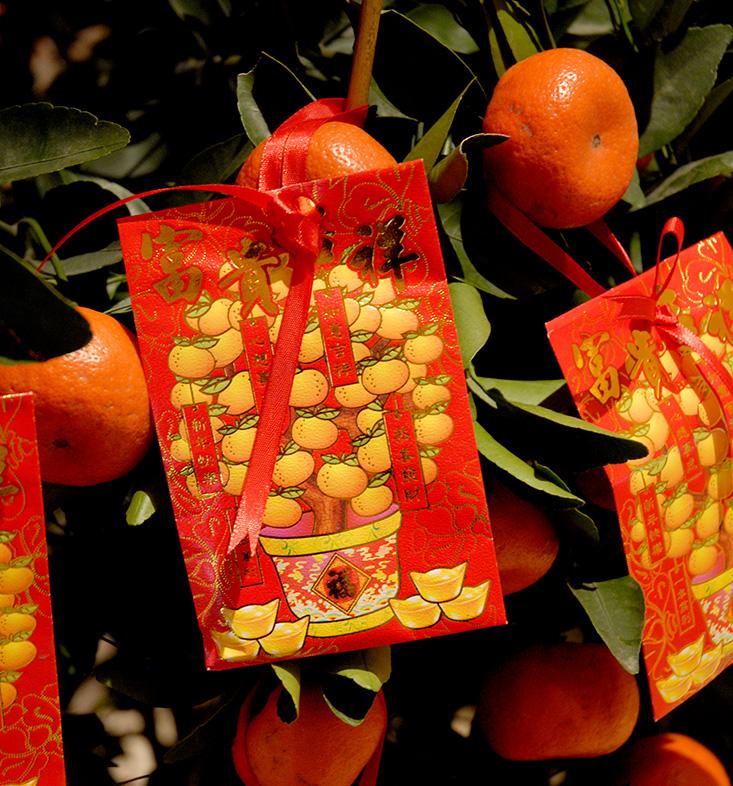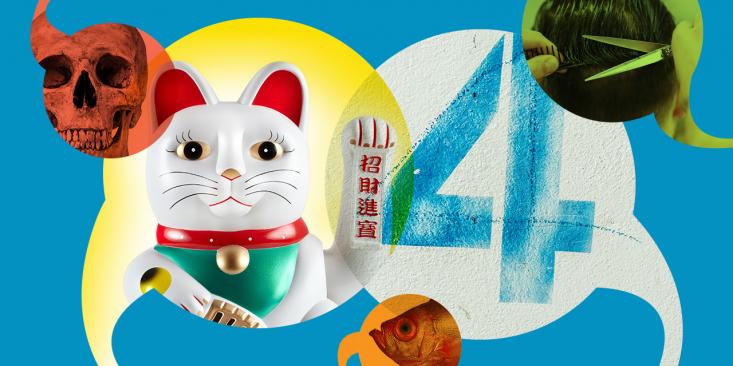Every year, more than a billion people around the world celebrate Chinese New Year and engage in a subtle linguistic dance with luck. You can think of it as a set of holiday rituals that resemble a courtship. To lure good fortune into their lives, they may decorate their homes and doors with paper cutouts of lucky words or phrases. Those who need a haircut make sure to get one before the New Year, as the word for “hair” (fa) sounds like the word for “prosperity”—and who wants to snip away prosperity, even if it’s just a trim? The menu of food served at festive meals often includes fish, because its name (yu) sounds the same as the word for “surplus”; a type of algae known as fat choy because in Cantonese it sounds like “get rich”; and oranges, because in certain regions their name sounds like the word for “luck.”
English speakers can relish a good pun, and messing around with homophones (words that sound the same but have different meanings) is a staple of many a clever ad. But Chinese practices take punning to a whole new level—one that reaches deep into a culture where good fortune is persistently courted through positive words and deeds, and misfortune repelled by banishing the negative. The number four is tainted because of its homophony with the word for “death”—many Chinese people would never consider buying a house whose address contained that number. In visual designs, fish and bats figure prominently because they are sound twins of the words for “surplus” and “fortune.” Gift-giving is fraught with homophonic taboos; it is all right to give apples, because their name sounds like “peace” but not pears, whose name overlaps with “separation.” Questions about why certain objects or numbers are considered lucky or unlucky are often met with matter-of-fact statements about their sound-alikes.

But why is homophony deeply woven into Chinese traditions and symbols but not Western ones? Ambiguity and homophony are facts of life for all languages, on a scale that rarely enters the consciousness of their native speakers. In 1978 psycholinguist Bruce Britton sifted through a million-word body of English text and estimated—very conservatively—that at least 32 percent of English words have more than one meaning. Among the 100 most frequent words, he found that 93 percent have more than one meaning, some as many as 30. Linguist blogger Geoff Pullum captures this ambiguity with his question: “What do support poles, staff positions, battery terminals, army encampments, blog articles, earring stems, trading stations, and snail mail have in common with billboard advertising, accounts recording, making bail, and assigning diplomats?” It may take a few moments of pondering to realize that the word that makes strange bedfellows of all these notions is post.
English speakers are sanguine about homophony—often blithely, so that they make little attempt to clarify meanings even when the context leaves open the possibility of more than one. In one study led by Victor Ferreira, people were asked to describe objects in visual scenes that showed both a baseball bat and a flying bat—but they ambiguously referred to either of these as simply “the bat,” under some conditions as often as 63 percent of the time.
“Languages love multiple meanings. They lust after them.”
But Chinese speakers seem to have a more sensitive radar for ambiguity. Psycholinguists Michael Yip and Eiling Yee have shared with me their impressions that Chinese speakers are more likely to take pains to clarify the intended meaning of an ambiguous word, even when its meaning should be obvious from the context. For example, Yee reported that they might say the equivalent of “I have to renew my mortgage, so I have an appointment with my bank—you know, the financial institution, not a river bank.” This type of attunement to ambiguity, if it turns out to be a general characteristic of Chinese speakers, certainly meshes with the elevated role of homophony in Chinese culture.
The connections between language, mind, and culture represent an open vista, a terrain that, for the most part, still awaits exploration by scientists. But, even today, the dance between ambiguity and luck in Chinese cultural practices hints at tantalizing questions: Do different languages heighten different subjective experiences for their speakers? And does the importance of certain concepts—like luck and misfortune—to a culture leave an imprint on its associated language?
Pullum contends that languages make no attempt whatsoever to skirt ambiguity—on the contrary, he writes, “Languages love multiple meanings. They lust after them. They roll around in them like a dog in fresh grass.” Steve Piantadosi, a psycholinguist at the University of Rochester, agrees. He and his colleagues have argued that far from being a bug, ambiguity is a useful feature for languages. It allows them to create ample vocabularies by recycling some of their most common and easy-to-pronounce clumps of sound. Without ambiguity, we would have to create longer words to distinguish meanings, or become more inventive at coming up with massive collections of speech sounds—and more adept at pronouncing and distinguishing these sounds.
If all languages love ambiguity, then Chinese languages burn with ardor for it. Direct comparisons of rates of ambiguity between languages are tricky, because even within a single language, different dictionaries often disagree about the number of separate meanings they assign to a word. But by any measure, Chinese homophony is truly prolific.
In English, as in many other languages, basic units of meaning (called morphemes) are often composed of processions of multiple syllables—hippopotamus, president, fastidious. But in languages like Cantonese and Mandarin, morphemes are almost always monosyllabic. These monosyllables aren’t necessarily stand-alone words, as most words in Chinese are compounds made up of two or more morphemes, each of which is represented by a separate character. Still, each syllable has to be assigned its correct meaning in order for a Chinese listener to grasp the intended meaning of the compound. Add to that the fact that Chinese languages use a much smaller set of vowels and consonants than English, and you have an impressive number of meanings packed into a small sliver of phonetic real estate.
Languages use words to capture reality, and the words we inherit as native speakers might in turn shape our vision of that reality.
Since distinct meanings in Cantonese or Mandarin are typically expressed by different characters, orthography (the way a language transfers spoken words into written form) is one useful way to track the number of different meanings that have the same pronunciation. Researchers Li Hai Tan and Charles Perfetti reported that within a 1.8-million-character body of Chinese text, 4,500 characters mapped onto only 420 different syllables—so that each character shared its pronunciation with an average of 11 others. In Piantadosi’s dataset, even if we look only at monosyllabic English words, which are more ambiguous than multisyllabic words, the average number of homophones that each word has is slightly less than one.
Amazingly, there’s no reason to believe that Chinese ambiguity creates a communication problem—experiments show that Chinese speakers are just as efficient as English speakers at squashing down irrelevant meanings based on context, and differences in tone also help to distinguish meanings. But the design of the Chinese writing system, in which different meanings of the same syllable are expressed by different characters, makes it hard for Chinese speakers to ignore the fact that they’re swimming in a sea of ambiguity.

Ambiguity has a way of drawing attention to itself when it creates orthographic headaches. While the many meanings of post may never have ruffled your thoughts, chances are that at one time or another, you’ve probably devoted a fair bit of focused effort to the distinctions among their, they’re and there as you tried to make sure that your spelling captured your intended meaning. Imagine having to do that for every set of homophones you encounter and you get a bit of a sense of what it takes to become literate in Chinese. No wonder then, that among Chinese children who are learning to read, a poor awareness of homophones is one of the strongest predictors of reading problems such as dyslexia.
All of this ambiguity has a direct effect on a Chinese speaker’s experience of her language, because ambiguous words can mentally activate more than one meaning. We know this from experiments that use a technique called semantic priming, in which participants are asked to identify whether a target word is a real word in the context of other words. Usually, people recognize a word more quickly if it’s preceded by a word that is related in meaning—so that the word nurse would be recognized faster if it occurred after doctor than after table. When people hear an ambiguous word like bug, even within a sentence that obviously selects one of its meanings, they’re often faster to respond to words related to the other meanings as well. For example, people will be better at recognizing both ant and spy after hearing bug than they will a completely unrelated word like sew.
Multiple meanings are held in the mind for only a fleeting moment—very quickly, meanings that are irrelevant in the context of the sentence become suppressed, almost always before they trip the wire of conscious awareness. This allows communication to proceed smoothly, even in languages as riddled with ambiguity as Chinese. But researchers have found that some words pull at attention more than others. Among those that command more than their fair share are words that stir up powerful emotional reactions, especially if they are negative or taboo.
Could cultural associations that shape individuals’ linguistic behavior eventually become embedded in the entire language?
When they happen to overlap in sound with other meanings, these attention-grabbing words should be especially hard to suppress. I’m reminded of how, growing up in a bilingual French-English region, I felt twinges of shyness—and drew snickers from some of my classmates—when I delivered a French-language oral report about seals, the marine mammals whose name, phoque, is homophonous with a certain English word that was definitely not supposed to be uttered in the classroom. It was a surprisingly uncomfortable word to use, regardless of the clarity of the context. And the aversion to certain homophones may be universal; I’ve noticed that even though several unrelated meanings are packed into syllables like bit or fit, there’s no non-sweary meaning of shit. Even when words do exist that sound just like certain emotionally charged words, they’re apt to be swapped out for synonyms—with rooster or donkey more likely to be used than cock or ass whenever people refer to the barnyard animals.
Rampant ambiguity in Chinese enables many phoque moments; phonetic space is crowded, and the likelihood that a perfectly ordinary word will share its sounds with a more emotionally strident one is just that much greater than it is in English. A cultural obsession with homophony is sparked by the compact nature of Chinese phonetic space.
In turn, culture affects which meanings create attentional flares. Chinese tradition dictates that the words you utter can attract luck—either good or bad—into your life, a tradition that is distilled during New Year celebrations, when all talk of death, disease, or divorce becomes taboo and people shower each other with wishes for good health, wealth, and success. It would not be surprising to find that words related to luck—and especially to misfortune—fall into the category of attention-grabbing words that Chinese speakers find hard to ignore. Though no experiments so far have tested this directly, it would provide a neat explanation for why Chinese speakers sidestep certain perfectly ordinary words while being drawn to others, based solely on which emotionally tinged words they sound like. Perhaps, as my Chinese colleague Wei Cai suggested to me, they might have an especially hard time suppressing meanings related to death or unhappiness during New Year celebrations, when the verbal courting of good fortune is on everyone’s mind.
Ambiguity provides a unique bridge between the meaning and use of words. When many meanings map to a single word, they are all more likely to be evoked, changing our experience of both the word and its meanings. If ambiguity allows cultural associations to lead individuals to sidestep certain words merely because they sound like “bad” words—as English speakers do when they use rooster instead of cock—perhaps they can also leave a broader imprint on the lexicon. Could it be that cultural associations that shape individuals’ linguistic behavior eventually become embedded in the entire language?
I asked researchers Ted Gibson and Steve Piantadosi, whose work suggests that languages recruit ambiguity for useful purposes, whether there was any statistical evidence indicating that languages repel ambiguity away from words that carry a negative emotional charge (or attract words that carry a positive charge). There isn’t—at least not yet. Both agreed that the notion was plausible and worth studying. To test this, psycholinguists would need to establish that emotionally disturbing words (like shit or rape) have fewer homophones than one would expect based on factors like their number of syllables, or how common their component sounds are. And perhaps words that arouse strong positive emotions (like rich or free) have more than their fair share of separate meanings.

If such a result is eventually found, it would offer a new way to think about how languages might be shaped by cultural values. In Chinese, we’d expect to find a language-wide reflex of Chinese luck traditions, in which certain homophones are given a wide berth because of their accidental association with misfortune and misery, while others are endorsed because of their coincidental connection to good fortune and prosperity. Chinese language, with its profusion of ambiguity, offers especially fertile ground for testing this hypothesis.
We have an endless fascination with the interplay between language and culture—how a culture might press its values and worldview into its language, and how a language might in turn mold the minds of its speakers. But much of the conversation about the bonds between language and culture turns on a very limited set of questions. For example: What does it say about Japanese culture that the language has a special word (ijirashii) to describe seeing someone praiseworthy overcoming an obstacle? Do speakers of languages that have a single word for blue and green have trouble distinguishing between these two colors? These questions focus on how languages use words to capture reality and how the words we inherit as native speakers might in turn shape our vision of that reality.
But Chinese hints at more intricate links between language and culture. Perhaps languages that jam many meanings into small phonetic spaces heighten their speakers’ experience of ambiguity, elevating the cultural importance of punning and wordplay; perhaps cultural associations cast an emotional tinge onto specific instances of ambiguity, remolding patterns of language use by speakers, and maybe eventually the lexical landscapes of entire languages.
Do luck and homophones provide a small doorway onto this uncharted terrain of the mind? If they did, as a psycholinguist, I’d have to consider that quite a piece of good fortune.
Julie Sedivy has taught linguistics and psychology at Brown University and the University of Calgary. She is the co-author of Sold on Language: How Advertisers Talk to You and What This Says About You and more recently, the author of Language in Mind: An Introduction to Psycholinguistics. Follow her on Twitter @soldonlanguage.






























